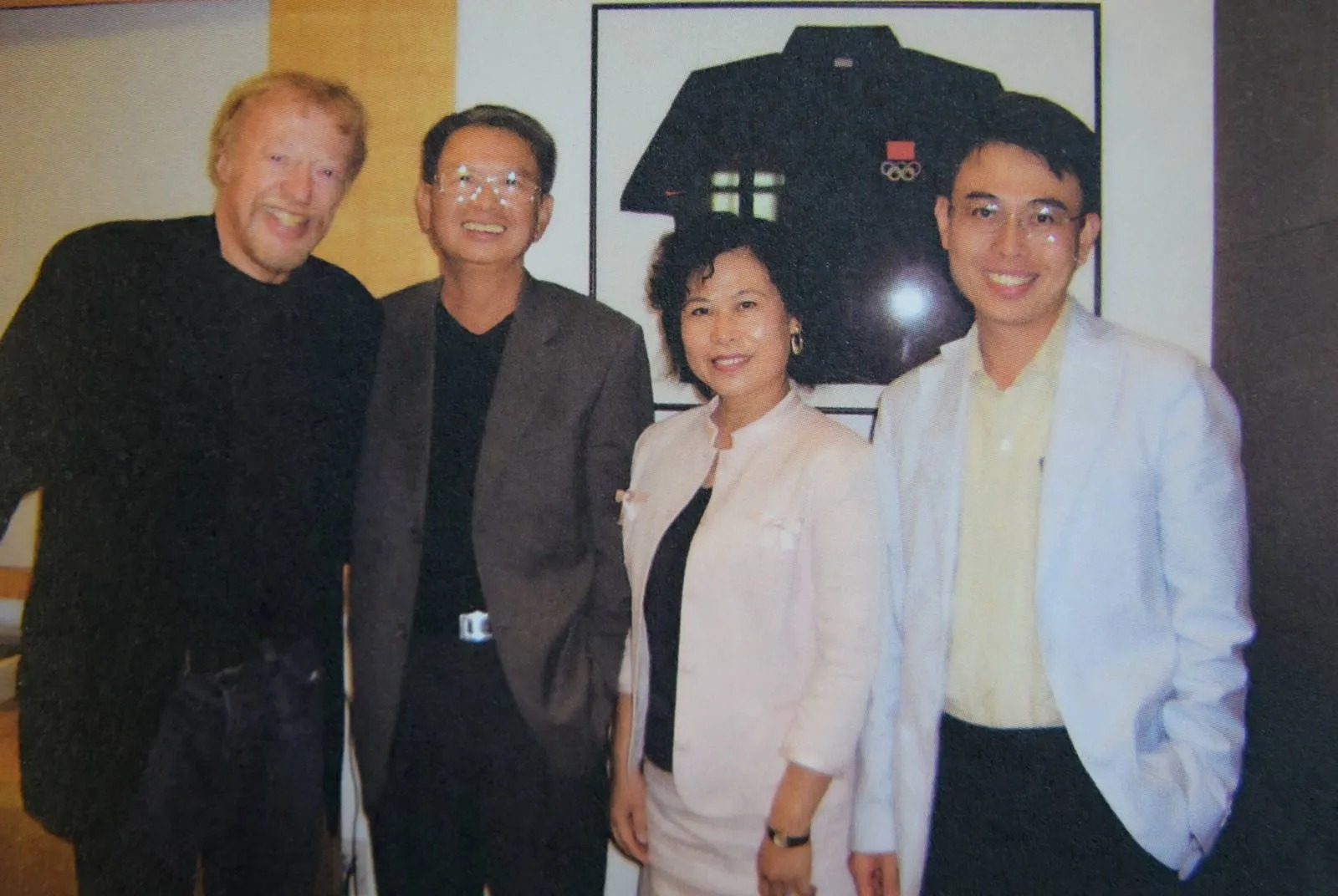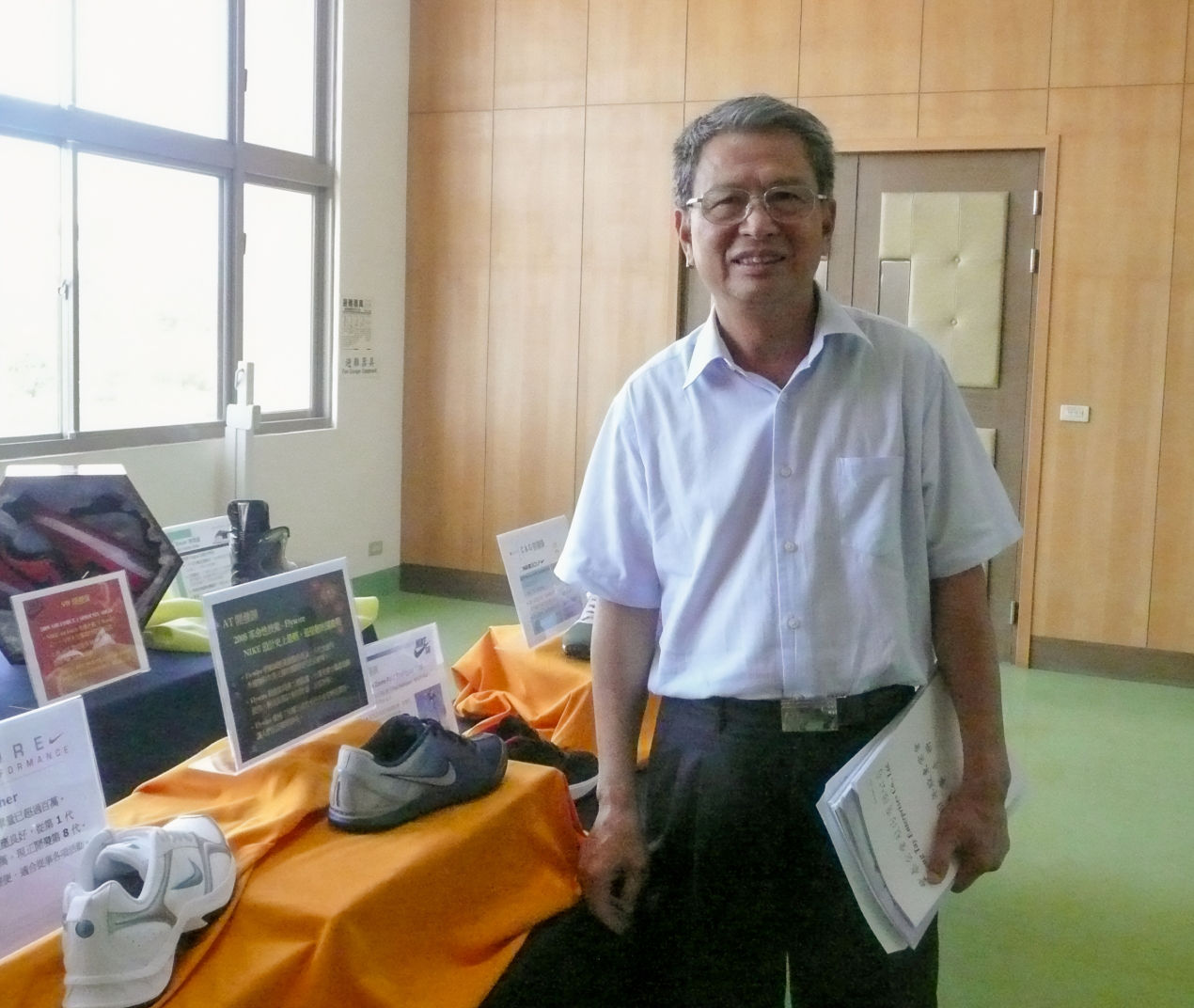Lifting the veil on top Nike supplier, Feng Tay

Source:CommonWealth Magazine
Wang Chiu-hsiung, founder of Feng Tay, is known for his unique management style praised by the founder of Nike as an artful approach. It involves aiding employees in building nurseries and restrooms without disrupting their work or bringing in external supervisors. This approach is a result of Wang's extensive experience managing factories at home and abroad.
Views
Lifting the veil on top Nike supplier, Feng Tay
By Hsiu-Hui HsuFrom CommonWealth Magazine (vol. 781 )
Six years ago, Feng Tay Enterprises CEO Wang Chiu-hsiung resigned, and handed over the keys to his son, Richard Chien-Hung Wang. The following year he also resigned from the board. And the next year the pandemic hit.
 Nike founder Phil Knight (left 1) and Feng Tay founder Wang Chiu-hsiung (left 2) have a 40-year revolutionary friendship.
Nike founder Phil Knight (left 1) and Feng Tay founder Wang Chiu-hsiung (left 2) have a 40-year revolutionary friendship.
In 2016, the year before Wang Chiu-Hsiung’s resignation, Nike founder Phil Knight handed the company mantle over to new CEO Mark Parker, who got Apple CEO Tim Cook to join the board. The new management team took an increasingly tight approach to supply chain management, and a more hardline attitude overall towards operations. Combined with the impact of Covid, the pressure on Feng Tay was off the charts, prompting Wang Chiu-Hsiung’s decision to write a memoir as an operational guide for “present and future Feng Tay people.”
The memoir, which came out last July, chronicles Feng Tay’s humble beginnings among the rice fields of Yunlin, tracing its steady expansion over 50 years, and detailing how it accomplished mission after difficult mission during collaboration with Nike to become Nike’s top contract manufacturer. Over this process, Feng Tay developed a unique management model and competitive advantage.
 The memoir of Wang Chiu-hsiung. (Source: Pei-Yin Hsieh)
The memoir of Wang Chiu-hsiung. (Source: Pei-Yin Hsieh)
For instance, on page 327 of his memoir Wang Chiu-Hsiung’s obstinate determination is palpable, emphasizing details, and adopting a fact-based, pragmatic management style.
People management step 1: provide commensurate wages and benefits
Shoe manufacturing is a labor-intensive trade, and Feng Tay oversees a global production workforce of 140,000 people. Known for its efficiency, it has earned the title of “the West Point of the shoe industry.”
Pai Chih-Hsiang, CEO of Fortune Victoree, which supplies shoe leather to Nike, rates Feng Tay as “the TSMC of Taiwan’s shoe industry.” And several other industry insiders were in agreement that Feng Tay is characterized by its “strict management system, with SOP (standard operating procedures) for all matters, large or small.”
However, in the early days Feng Tay suffered plenty from poor management. The company’s management philosophy was established from the blood, sweat and tears accumulated in factory operations both in Taiwan and around the world.
In his memoir, Wang Chiu-Hsiung recalls writing a letter to Li Chang-yi, then the director of the Small and Medium Enterprises Administration of the Ministry of Economic Affairs. In his candid message, he asserted that the government had abandoned labor-intensive industries like textiles and shoemaking, and advocated for proactive leadership to create added-value across various industry sectors, instead of allowing industry obsolescence.
Wang Chiu-Hsiung also delved into the pains and losses suffered due to poor management. “With competent management talent, annual profits could have been boosted by 5.5 percent,” he offers.
Over the following decades, Wang Chiu-Hsiung invested significant efforts in establishing various management systems. He placed particular emphasis on the transparency of the compensation system, considering it the crucial first step in unifying the 140,000-strong production workforce. Especially in overseas factories typified by powerful unions and tens of thousands of employees, a reasonable and transparent compensation system could provide stability.
The most concrete example is a strike at the Vietnamese factory. In 2005, the Vietnamese management had promised that if the company turned a profit it would issue bonuses to workers. However, that promise was not kept, leading to a collective strike. Wang Chiu-Hsiung personally flew to Vietnam to mediate, promptly announcing the bonus payout and, simultaneously, reviewing the local salary structure. After identifying numerous unreasonable conditions, he decided to overhaul the salary contracts across the board.
 (Source: UDN news)
(Source: UDN news)
A month later, Wang Chiu-Hsiung returned to Vietnam, spending an entire day meticulously confirming the new contract clause by clause with the union before making it public. Over the next five years, he personally participated in annual salary adjustment meetings. As a result, the Vietnamese factory stabilized and progressed tremendously, so that today it stands as Feng Tay's largest overseas production facility.
Feng Tay also takes great pains to ensure that employees are well situated. Forty-three years ago, when the company's workforce numbered just 800, it established a kindergarten exclusively for the young children of its employees.
In its Vietnamese factories alone, Feng Tay established two kindergartens, each capable of accommodating 1000 children, demonstrating the company's commitment to caring for its workers' children. At its facility in Indonesia, Feng Tay sponsors two employees every year to make the pilgrimage to Mecca. In India, the company helps fund school construction, and collaborates with Changhua Christian Hospital on medical outreach to provide regular check-ups, and even building toilets and bathrooms for local households. These initiatives are all part of Feng Tay's mission to integrate its employees into the company's fabric, allowing them the peace of mind to focus on their work.
In his approach to human resource management, Wang Chiu-Hsiung's "Five No's" principle sets Feng Tay apart from its industry peers: No migrant labor, no foreign workers, no cooperative education graduates, no contract workers, and no poaching from other companies.
While industry, due to labor shortages and cost considerations, went to great lengths to attract migrant workers, Wang insisted that Feng Tay not employ migrant workers in Taiwan, instead placing priority on hiring locals from Yunlin. Today, 80-percent of the company’s 2700 workers are from Yunlin, including 300 married couples.
In India, where many companies commonly rely on contract workers, Feng Tay stands out by exclusively employing permanent staff. These steadfast principles are rooted in a deep belief that they can bring about a stable workforce.
His leadership style in managing the company is even more iconoclastic. During the early days of the business, a representative from company client Mitsubishi once compared Wang Chiu-Hsiung’s strict attitude about product quality to that of a Red Guard. To emphasize his determination, Wang Chiu-Hsiung once set fire to over 10,000 defective products within the factory premises.
The story of his 11-day stay as the head of the Indian factory further exemplifies his keen oversight skills.
 Nike Asia's first R & D center in Feng Tay Douliu headquarters.
Nike Asia's first R & D center in Feng Tay Douliu headquarters.
In 2011, Feng Tay's Indian factory experienced three strikes, leading to low morale and reduced work efficiency. To boost quality standards, Wang Chiu-Hsiung personally traveled to India. He randomly inspected production lines every day, patrolling the frontlines and documenting recommendations for improvements to send to the management team.
His attention to detail extended from whether employees had time to take breaks for water or restroom visits, to when the factory curtains should be drawn to reduce glare and disturbance to production line workers.
In pursuit of quality, Wang Chiu-Hsiung places great emphasis on the technical proficiency of production line personnel.
Upon hiring, production line workers undergo a month-long specialized training program, only graduating once they can produce a pair of shoes that can pass quality control standards. Subsequently, each new employee is paired with a mentor, to pass along production line job skills through an apprenticeship system.
The effectiveness of this management approach is evident in its efficiency. Lai Chi-Chien, secretary-general of the Taiwan Footwear Manufacturers Association, shares his firsthand experience working at Feng Tay, which serves as an apt illustration.
He recalls one time when he rode in Wang Chiu-Hsiung’s car. As soon as he got in, Wang started grilling him with questions, such as “what areas do you think the company could improve?” Lai responded that Feng Tay employs a number of disabled persons, but the restrooms were not fully accessible to those with disabilities.
Upon hearing this, Wang directed him to send a letter to all relevant units.
Lai sent the letter at 8:00am the next morning, and 25 minutes later Feng Tay had completed cost estimates, issued contracts, and set completion dates for construction.
Nike founder: Wang is a lot like me
Wang Chiu-Hsiung established the management system. But the real guiding forces over the 140,000-strong production line workforce are the local supervisors.
In 1994, several high-ranking executives from Taiwan and Fujian resigned from their positions to embark on entrepreneurial ventures, enticing many skilled technical personnel to join them. Responding, Wang Chiu-Hsiung personally took charge in Fujian for five months in a row, spearheading manpower localization. Starting from the Fujian factory, he oversaw the birth of the first overseas factory manager not dispatched from Taiwan. At the same time, he oversaw the reconstitution of overseas factory protocols and practices, including setting up a transparent salary payment system. The realizations and learnings made along the way “were continued in the management of successive operations in Vietnam, Thailand, and India, laying the foundation for Feng Tay’s internationalization.”
To this day, few in the industry can compare to Feng Tay, at which all overseas management teams are composed entirely of locals.
Phil Knight once likened Wang Chiu-Hsiung to himself, saying, "I feel that he and I are quite similar. Both of us believe that the company is not just our livelihood, but also the embodiment of our philosophy toward the art of living… He didn't run off to Bali or the Caribbean to enjoy life after achieving success; he sees shoemaking as his life's mission, and is determined to do it to the best of his abilities."
Have you read?
- The world of athletic footwear: ‘Made by Taiwan’
- This Taiwan firm turns PET bottles into Nike shoes and LEGOs
- The ‘hidden champion’ behind Nike and Adidas sneakers
Translated by David Toman
Uploaded by Ian Huang






